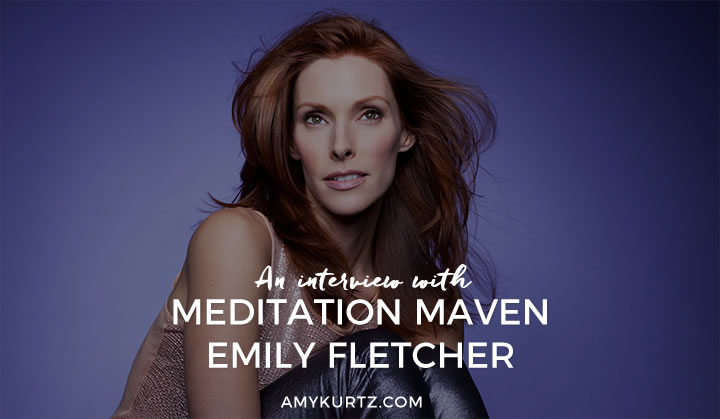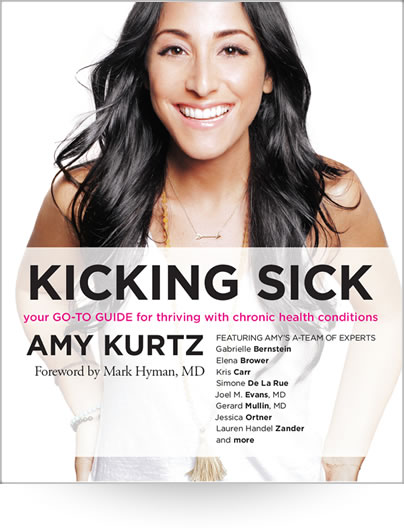I am a strong believer in the power of meditation, especially for people like me who suffer from chronic illness. I was fortunate to have had a great introduction to meditation by taking lessons from Emily Fletcher, founder of Ziva Meditation and one of the world’s leading experts in meditation. Meditation has changed my life for the better in so many ways that I asked Emily if I could share some of her wisdom with you.
When you get to know Emily you understand how well suited she is to teach busy people how to incorporate meditation into their lives. Emily was inspired to become a meditation teacher after experiencing the profound physical and mental benefits it provided her during her career on Broadway, which included roles in Chicago, The Producers, A Chorus Line and many other shows. Emily began her ten years of training in Rishikesh, India under world-renowned meditation instructors. She has been featured in the New York Times and been invited to teach at Google, Summit Series, Harvard Business School,Barclays Bank and Viacom. She is a regular on Huffington Post LIVE and just had the honor of teaching alongside Jon Gabriel at The Omega Institute and at GATE, the Global Alliance of Transformational Entertainment with Eckhart Tolle.
I asked Emily a series of questions about Vedic meditation, which derives from ancient Indian traditions and is the kind of meditation we both practice. Here are her inspiring answers.
Amy (A): What is meditation?
Emily (E): At Ziva we define meditation, quite simply, as a stress relieving tool.
A: Who can benefit from meditation?
E: Virtually everyone. There are different styles for different people. The style of meditation that we teach is meant for people with busy minds and busy lives. Mindfulness is derivative of a style that was made for monks. Ziva Meditation is made for people who have a job and kids and ‘stuff’ to do and therefore less time in their day to meditate. If you have less time, you want to use a practice that is more powerful so you can really deep clean and bring the sparkliest version of you to every situation.
A: How does Ziva differ from other types of meditation? What makes it special?
E: The purity of the 6,000-year-old practice is not lost, but the delivery is super accessible, relatable, and even entertaining. Plus, the community of Ziva practitioners is a very special collection of goodness.
A: How is this method of meditation “doable” for a busy, on-the-go person?
E: One of the things that makes it so special is that once you go through the training you are a totally self-sufficient meditator. This means you can meditate anywhere, anytime. Planes, trains, and automobiles have never been so relaxing.
A: Can you talk about the importance of meditation and how it helps us create change?
E: The only constant is change. The Vedic viewpoint is that the only constant is progressive change. Everything is evolving whether we like it or not, whether it is happening in the timing we would choose or not.
A: Go on.
E: Meditation helps us tap into that piece of us that is connected to everyone and everything. So you think twice before harming someone else, and you are much quicker to help someone because you see more of yourself in them.
A: What are the benefits of meditation?
E: How long do you have? Here is my most recent top ten best benefits of meditation:
- Better sex
- Deeper, more refreshing sleep
- Increased creativity
- Increased awareness of the present moment
- Increased compassion
- More energy
- Enhanced intuition
- Less anxiety
- Less depression
- Better parking karma.
A: What are the specific benefits of meditation for chronic illness?
E: Meditation helps alleviate the stress of a busy life from your nervous system, which allows all of your other body functions to work as nature intended. This includes immune function. Many illnesses are labeled “chronic” because the body has never gotten the rest it needs. Meditation gives you rest that is even deeper than sleep, so the body can start to heal itself the way it was meant to heal.
A: Why are you a meditation teacher? Why do you do what you do?
E: Selfishly, I love waking up to emails from people telling me how their lives have improved through this style of meditation.
A: How did you get started on your meditation journey?
E: During my 10 year career on Broadway I was performing in the musical A Chorus Line and was an understudy for three different parts. I never knew who I was going to be for any given performance. Sometimes they would switch me from one character to another during the same show. It was incredibly high demand and I started having insomnia, going gray at 26 and getting sick and injured I asked the woman sitting next to me in the dressing room, who was understudying five roles, how she was able to perform her job with such ease. Her answer was simple: “I meditate.”
A: That’s it?
E: Well, not exactly. It took a few more months of living in a state of complete angst before I was willing to do just about anything. I finally signed up for the four day course. On the first day of the first course I was meditating. That night I slept through the night for the first time in 18 months. I have every night since and that was ten years ago.
A: What are three things you would say to someone who is considering starting meditation?
E: Number 1: Do it.
Number 2: Find a teacher you respect.
Number 3: Thoughts are not the enemy.
A: Thank you, Emily.
You can read more about Emily and the classes she teaches at zivameditation.com, and I hope that you do. Since learning how to incorporate meditation into my busy life, I have reaped so many benefits that now I can’t imagine a day without it. That’s because I meditate every day. Not because I have to, but because I want to. You should give meditation a try—and let us know how you do.


